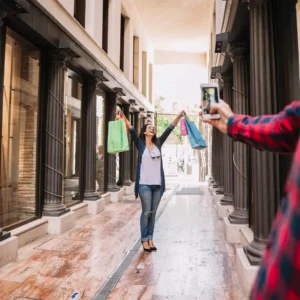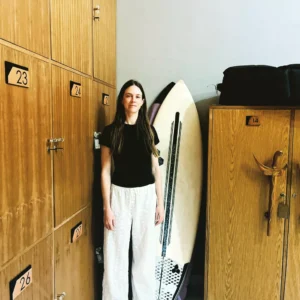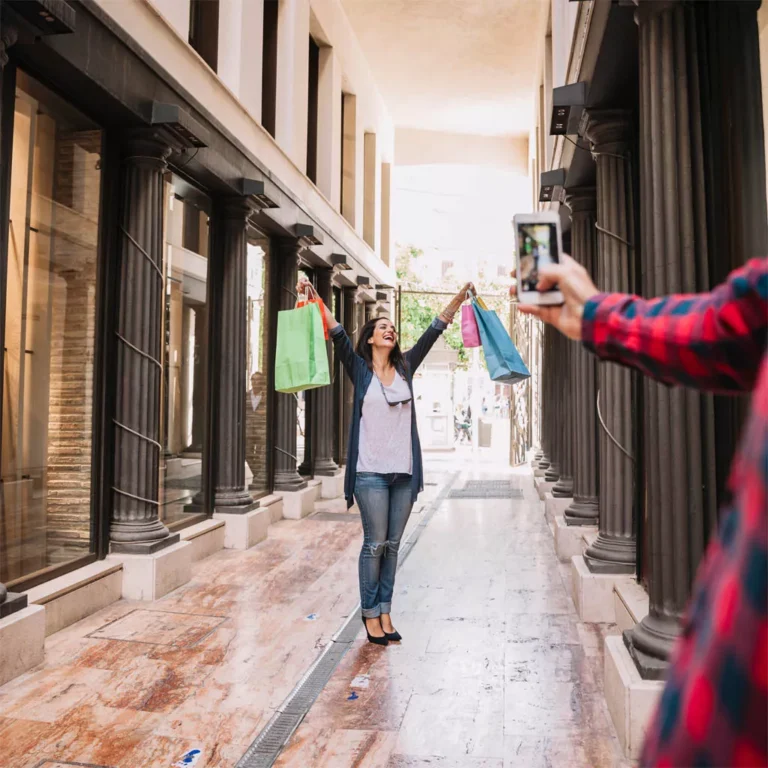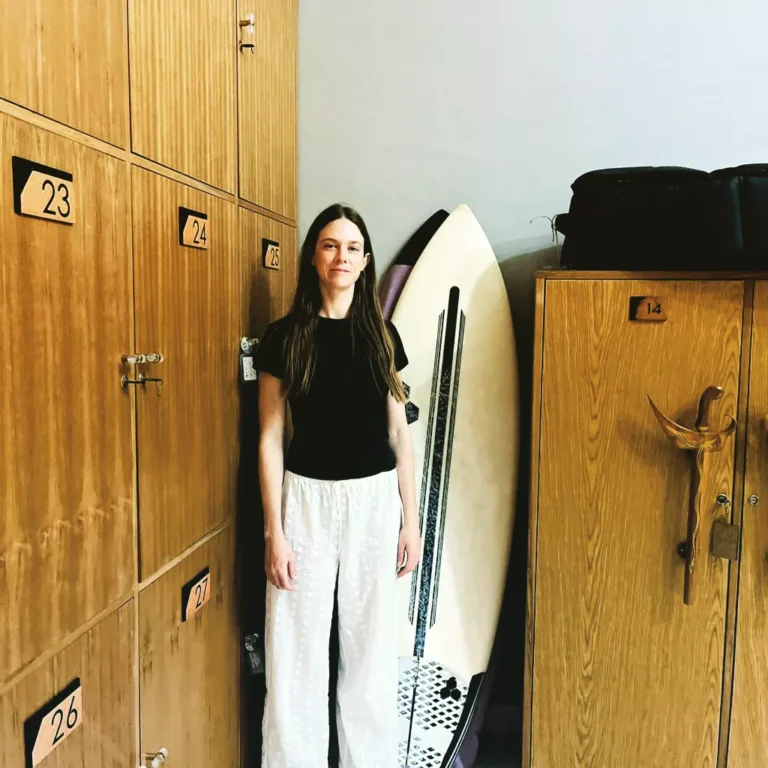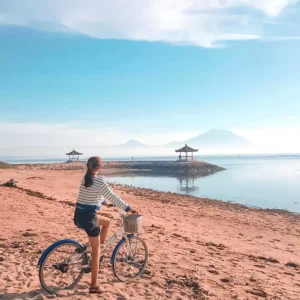Chapters
Toggle1. You’re not lost. You’re just new here.
First Time in Bali – And welcome — genuinely — to the island where even the chaos has rhythm.
If you’re standing in the middle of a Bali street, sunscreen sneaking into your eyes, watching a long line of ceremonial umbrellas and wondering whether it’s a parade or just daily life passing by, relax. That confusion is part of the initiation.
Bali isn’t a “destination” in the way travel ads like to package it. It’s not a curated attraction with tidy opening hours. It’s a living social ecosystem, shaped by community, ceremony, and a sense of time that existed long before Google Maps tried to make sense of it.

Where you come from, time probably behaves. Here, it stretches and softens. It waits for rain to finish, for incense to burn out, for a conversation to reach the right ending. Call it jam karet if you like, but it isn’t inefficiency. It’s simply a different logic.
So if you arrived with a color-coded itinerary—and the expectation that Bali will follow it—consider this your gentle invitation to let it go. Bali never signed that contract. It runs on an older script, one that rewards those who stay open.
What you need most on your first visit won’t fit in your suitcase.
Not sunscreen. Not flip-flops.
It’s flexibility. And a bit of humility.
The magic here doesn’t show up when you’re rushing between locations. It shows up in the pauses—when plans shift, when a stranger offers a story, when your detour becomes the best part of the day. The more you loosen your grip, the more the island opens up.
Trust this: Bali gives more to those who don’t insist on controlling it.
〰️🌀〰️🌀〰️🌀〰️
2. How Bali Actually Works: The Logic You Don’t See on Brochures
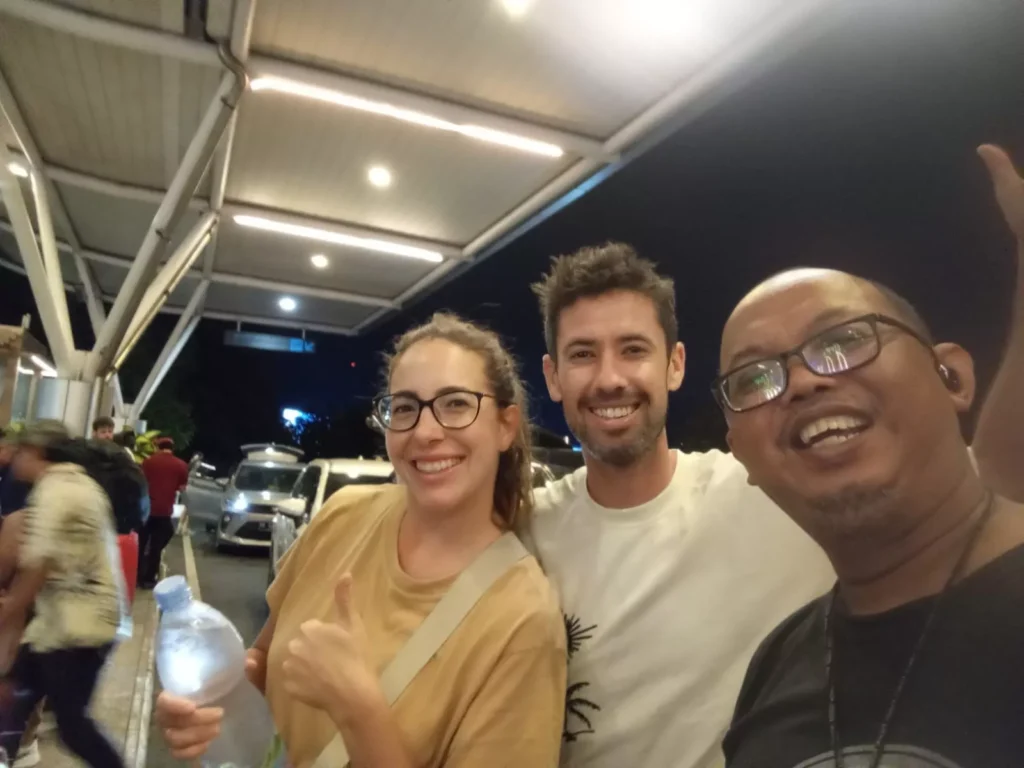
If this is your first time in Bali, here’s the truth nobody puts in a brochure: the island runs on an operating system you won’t fully see, but you’ll absolutely feel. Once you understand the logic, everything here suddenly stops looking chaotic and starts looking beautifully intentional.
A. Time, but Make It Bali Time
Your home country runs on minutes. Bali runs on meaning.
When your driver says, “Five minutes, boss,” don’t bother checking your watch. It’s not a countdown. It’s a warm promise. It means: “I’m coming, but life is happening. I’ll arrive before you panic.”
This isn’t inefficiency. It’s emotional intelligence. It’s courtesy filtered through culture. The moment you stop fighting the tempo and start dancing with it, your first time in Bali shifts from confusing to magical.
B. The Etiquette Nobody Told You, but You’ll Want to Know
There’s no written exam, but there is a vibe.
At a warung: A soft “permisi” and a smile goes further than frantic hand-waving. You’re in someone’s home, not a fast-food counter. One of those tiny, unspoken Bali travel tips that makes your first time in Bali feel less like tourism and more like connection.
At the market: Bargaining is a gentle flirtation. Not a wrestling match. If you’re haggling over the price of your morning latte back home, take a breath.
Anywhere: Cigarette butts are not biodegradable décor. Treat the island like you’d treat a friend’s living room — because it is someone’s.
C. Banjar: The Engine You Didn’t Know You Were Hearing
That sudden road closure? That gamelan rehearsal thundering from a hidden alley? Those penjor poles turning your street into a bamboo cathedral?
Meet the banjar.
It’s not a “neighborhood association.” It’s the island’s backbone — a community system that handles everything from ceremonies to conflict resolution to “Why is the entire road blocked at 4 p.m. on a Tuesday?”
When a ceremony halts traffic, you’re not being inconvenienced. You’re witnessing a thousand-year-old community machine running exactly as intended. Turn off the engine. Watch. You’re getting front-row seats to something irreplaceable.

D. “Rajin Sembahyang”: The Daily Reset Button
Before you’ve had your first coffee, someone in Bali has already prayed, made an offering, balanced a tray on their head, and expressed gratitude for the day.
This is Rajin Sembahyang — not religion as a weekend activity, but a daily conversation with the universe. It’s the rhythm that softens the edges of life here, the reason people seem so calm even when the world swirls around them.
If it’s your first time in Bali, watch how effortlessly these rituals blend into daily life. It’s not performance. It’s a quiet reminder that harmony is something you make, not something you hope for.
〰️🌀〰️🌀〰️🌀〰️
3. Your First 48 Hours: A Soft Landing, Not a Bucket List

If it’s your first time in Bali, here’s the smartest decision you can make: forget the checklist. The first 48 hours are not for “achievements.” They’re for tuning your body, brain, and expectations to a new rhythm. Think of it as a soft landing — not a sprint.
a. Day One: Let the Island Come to You
Today is not the day to chase waterfalls. Today is the day to breathe.
Step outside your accommodation and just walk. Left or right, doesn’t matter. Let the island make the introductions: the sound of woks firing in tiny warungs, frangipani drifting through the air, incense curling up from morning canang sari offerings.
For your first meal, be bold. Skip the avocado toast. Point at something mysterious in a warung’s glass display and say, “Saya mau coba itu.” You’re not just eating — you’re letting culture in through your senses.
For anyone experiencing their first time in Bali, this is the real orientation session. No rush, no goals. Observe the pace. Let the island set the tempo.
b. Day Two: Choose a Vibe, Not a Destination

Now that you’ve found your footing, widen the circle. The biggest mistake for anyone on their first time in Bali is trying to see everything too fast. Don’t ask, “What should I see?” Ask, “How do I want to feel?”
- If you want creative energy and social buzz, go to Canggu.
- If you want slow mornings and green horizons, head toward Ubud’s outskirts.
- If you want something calm and seaside, Sanur will treat you gently.
Pick one area that matches your mood, then give yourself permission to simply be there. Sit in a cafe, wander aimlessly, get a massage, let the neighborhood reveal its patterns.
Here’s the honest rule: if your day has more than three planned things, you’ve officially over-planned. A good Bali itinerary — especially for your first time in Bali — needs generous empty space. That’s where the real magic slips in: the accidental detour, the conversation with a stranger, the hidden alley you stumble into.
The island doesn’t reward efficiency. It rewards curiosity. Slow down and it starts speaking to you.
〰️🌀〰️🌀〰️🌀〰️
4. What Not to Expect: The Reality Check That Sets You Free
For anyone experiencing their first time in Bali, half the joy comes from unlearning the fantasies you packed in your suitcase. This isn’t negativity — it’s liberation. When expectations meet reality in the right way, the island becomes a lot more magical.

a. Bali Isn’t a Pre-Packaged Wellness Dream
Yes, the yoga scene is incredible. Yes, the smoothies are photogenic. But the island is not a 24/7 wellness retreat waiting to align your chakras. The real Bali is a blend: incense in the morning, scooter symphonies by noon, ceremony traffic at dusk. You can find deep stillness in a temple courtyard, then five minutes later nearly get run over by a chicken. That coexistence is the charm. If it’s your first time in Bali, don’t expect perfection; expect personality.
b. Ubud Isn’t Automatically a Sanctuary of Silence
The postcards forgot to mention the part where the serene rice terraces lead to a lively town center full of scooters, craft shops, and ducks who refuse to use the sidewalk. Ubud is culture, movement, and creativity packed into one valley. Silence exists — on a ridge walk at sunrise, or in a tiny cafe tucked behind a shrine — but you have to go look for it. That search is part of the experience.

c. Not Every Beach Is Your Personal Pool
Here’s a Bali travel tip every first-timer should know: many beaches are better admired than entered. The island’s coastline is wild and expressive. Uluwatu’s waves are for surfers with good insurance, not for casual sunset dips. Currents are strong, breaks are powerful. Ask locals, read the signs, and save your swims for friendly waters like Sanur or Nusa Dua. This isn’t a downside — it’s a reminder that nature here has personality, not presets.
d. Your Itinerary Is a Suggestion, Not a Contract
If you’re having your first time in Bali, accept this early: your plans will break. And it’s going to be wonderful. Rain appears out of nowhere. Streets close for ceremonies. A random local invites you to drink coffee and suddenly an hour disappears. These aren’t delays; they’re invitations. The island edits your schedule to make room for things you wouldn’t have chosen but will never forget.
When Bali bends your plan, don’t fight it. That bend is the real story.
〰️🌀〰️🌀〰️🌀〰️
5. Your Social Map of Bali: Find Your Frequency
When it’s your first time in Bali, the smartest question isn’t “Where should I stay?” but “What kind of energy do I want to live in?”
On this island, geography matters far less than frequency. Different corners of Bali run on entirely different wavelengths — pick the one that matches yours, and the whole trip clicks.
a. The Energetic Strip: Kuta & Legian

This is where Bali tourism took its first steps, then sprinted, then never slowed down again. It’s neon, loud, sweaty, social, and endlessly alive. Street after street of bars, beach clubs, and shops selling everything from sarongs to very confident fake watches.
The vibe: an eternal, sunburned version of spring break.
If your perfect evening involves herbal tea and being in bed by nine, Kuta and Legian will humble you. But if you’re here for your first time in Bali and craving noise, people, cheap beer, and chaos you don’t have to apologize for — welcome home.
b. The Creative Bubble: Canggu

Survive the traffic and you earn access to Bali’s buzzing creative hive. Canggu is the beating heart of cafe culture, a hub for remote work leagues, and ambitious twenty- and thirty-somethings reinventing their lives after one too many espressos.
The vibe: a digital village where half the crowd is building a brand and the other half is photographing their brunch.
Reality check: The famous Canggu traffic isn’t a bug — it’s a feature. Scooter gridlock is where friendships form, ideas spark, and patience goes to die. But stay long enough and it becomes part of its charm. This is the Bali frequency for people who like life with a shot of espresso and a bit of chaos.
c. The Calm Center: Ubud

Ubud town itself can be surprisingly lively. But the outskirts — the forests, the ridges, the rice fields — offer something completely different. This is where seekers, artists, and exhausted city people come to remember how to breathe.
The vibe: soulful quiet wrapped inside gentle movement.
You’ll have those cinematic “I’m finally at peace” moments, usually right before a scooter caravan whizzes past. That combination is Ubud in a nutshell: tranquility with a heartbeat. For your first time in Bali, it’s where you go when you want the island to slow you down in the best possible way.
d. The Gentle Coast: Sanur

If Canggu feels like your inbox and Kuta feels like your nightlife history, Sanur feels like a deep exhale. Mature, calm, and quietly confident, this is the part of Bali that doesn’t need to shout to get your attention.
The vibe: morning walks, gentle waves, and the satisfying click of a bicycle chain.
The beachfront path is perfect for jogging, strolling, or doing absolutely nothing. It’s the low-key beach town you recommend to friends when you secretly want to keep the best spot for yourself. For anyone experiencing their first time in Bali and craving a real rest — this is your sanctuary.
〰️🌀〰️🌀〰️🌀〰️
6. How Money Moves in Bali: Honest, Practical, and No Drama

Let’s talk about money. Calmly. No shame, no panic, no “Wait, why is this smoothie bowl more expensive than my haircut?” Bali’s money flow is its own ecosystem, and once you understand how it works, budgeting becomes a lot less emotional and a lot more… Bali.
a. The Price Spectrum: Local, Tourist, and The Grey Area
You’ll bump into three flavors of pricing on the island. Don’t think of them as traps. Think of them as ecosystems with their own logic.
Local Price:
The kind you find in small warungs where the chairs wobble a little, the food is honest, and the customers actually live here.
Tourist Price:
You’re paying for AC, English menus, imported almond milk, and the fact that someone just carried a whole tray of food through a crowd of people filming themselves for Instagram. Fair enough.
The Negotiable Price:
Markets, freelance drivers, small vendors. Negotiation is fine—just make sure it’s done with context and kindness. Haggling over 5,000 Rupiah after casually dropping 200k on a neon-lit cocktail? That’s some Olympic-level irony.
b. Cash, Card, and the Sudden “Machine is Broken” Moment
Bali does take cards—but Bali also takes breaks. A lot of them.
Trendy cafes in Canggu and Seminyak will happily swipe your Visa. But real local life still runs on cash, and you’ll thank yourself for carrying some.
The Reality:
When someone says, “Machine broken,” don’t assume it’s a scam. It might be the internet, the network, the weather, or the moons of Jupiter. Or maybe the business just prefers to avoid card fees. Either way—cash saves the day.
Pro Tip:
Use ATMs attached to banks or reputable places during the day. And carry small bills unless you want to become that tourist who hands a warung a 100k note for a 12k coffee.

c. The Fine Print of Fun
The price you see is rarely the price you pay at more polished places.
Beach Clubs & Restaurants:
That extra 21% tax and service charge isn’t a plot twist—it’s standard. So that “affordable” mojito? Yes, it’s now 21% more enlightened.
Activities & Transport:
Ask whether the quote is all-in. A simple “Sudah termasuk semua?” works wonders and prevents the surprise of a last-minute parking fee, entrance fee, or “ceremony day surcharge.”
d. Tipping: An Act of Kindness, Not a Calculation
Tipping isn’t mandatory in Bali but it’s genuinely appreciated. Think of it as a small kindness that stays in the community.
How It Works:
Round up your driver’s fare. Leave your coins at the warung. Give your massage therapist a 50k thank you for making your spine feel brand new. It’s simple and meaningful—no calculator required.
〰️🌀〰️🌀〰️🌀〰️
7. How to Read Bali: The Unwritten Guide to the Island’s Soul
Bali speaks in ways that don’t rely on words. The island communicates through ritual, rhythm, and tiny daily gestures that locals absorb without thinking. If this is your first time in Bali, learning to read these signals is the moment you shift from “tourist with an itinerary” to someone who actually understands the island. This is the real Bali culture—unpack it slowly.
a. Canang Sari: A Daily Prayer, Not Decor

You’ll see canang sari everywhere—on sidewalks, motorbikes, shop entrances. They’re delicate, fragrant, and often misunderstood by newcomers who assume they’re pretty decorations.
What it is:
A daily expression of gratitude and balance. This offering is a core part of Balinese spirituality, placed with intention and calm. It’s a gentle reminder that life here moves in harmony with the unseen.
The one rule:
Don’t step on it. Not even by accident. Walking around an offering is one of the simplest but most important Bali etiquette basics. It sets the tone for how you interact with Balinese traditions.
b. Penjor: The Graceful Bamboo Arches of Celebration
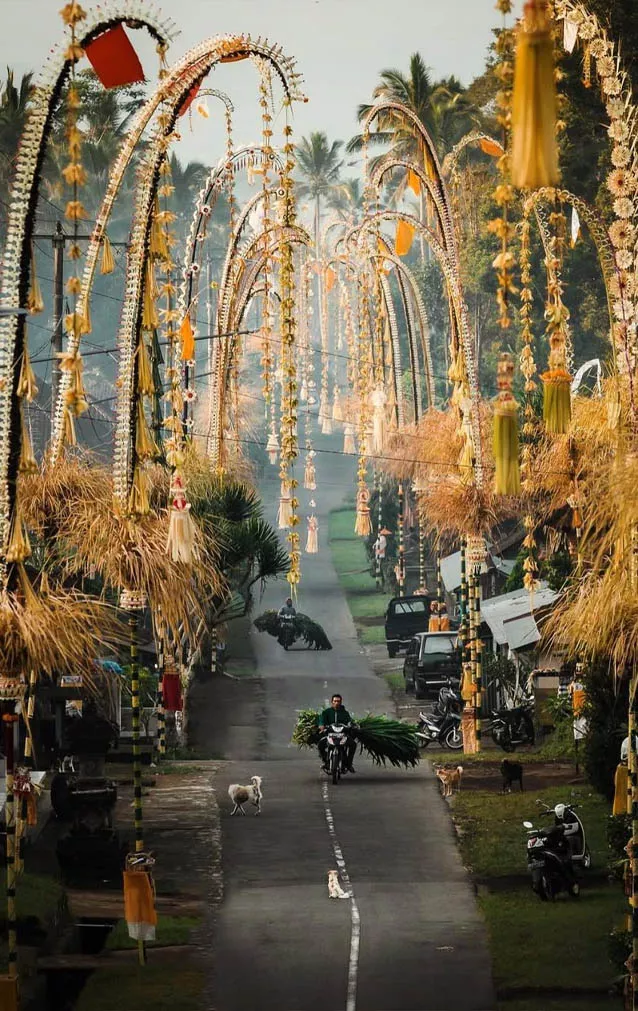
Those tall bamboo poles bowing over the streets? Those are penjor—one of the most recognizable symbols of Balinese culture.
What they mean:
Penjor are created for Galungan and Kuningan, the island’s major religious holidays. The curve represents Mount Agung. The decorations symbolize abundance. Everything is handmade, temporary, and deeply meaningful.
Why they matter:
If you arrive in Bali during a street full of penjor, consider yourself lucky. You’re seeing the island in ceremonial mode—one of the most photogenic and culturally rich times to visit.
c. The Dogs of Bali: The Island’s Unofficial Residents

You’ll notice free-roaming dogs long before you Google “Bali dogs.” They wander, nap, bark at scooters, and occasionally act like they run the block.
Their role:
Most aren’t stray in the way visitors imagine. They often belong to a family or a banjar community. Think of them as neighborhood guardians with questionable work ethic.
How to interact:
Admire from a respectful distance. No sudden petting, no assuming they want cuddles. Their vibe matches the island: relaxed, independent, and quietly observant.
d. Traffic Lights: A Gentle Suggestion

If you’ve heard rumors about Bali traffic, yes—some of it is true. It’s not chaos; it’s collaborative improvisation.
The logic:
Traffic moves through eye contact and social intuition more than strict rules. On quiet nights, lights can feel like guidelines. Everyone negotiates the flow with patience and shared understanding.
Your move:
Whether driving or crossing, be steady and predictable. In Bali, confidence is safer than hesitation. This is one Bali travel tip that sounds small but matters a lot.
e. Warung vs Rumah vs Restaurant: Reading the Buildings

Balinese architecture is honest. What you see is what it is—no guessing required.
Warung:
A simple, open-front shop selling snacks, drinks, or home-style food. This is where local life happens and where you’ll find some of the best meals in Bali.
Rumah (House):
A family home with a small temple inside the compound. Closed gates mean “not a public space.” Respect that boundary.
Restaurant / Cafe:
Clear signage, menus, and proper seating. If you see fancy lighting and cold brew equipment, yes—you’ve entered the tourist ecosystem.
Understanding these distinctions is one of the most useful first time in Bali skills. It helps you navigate respectfully and unlock experiences you’d miss if you stick to tourist zones.
〰️🌀〰️🌀〰️🌀〰️
8. First Time in Bali : The Local Logic Behind What Tourists Complain About

Every first-time visitor has a list of “Why is Bali like this?” questions. The traffic, the noise, the timing of things, the way the island seems to run on intuition rather than schedules. But here’s the twist: the things that frustrate newcomers are the exact things that make Bali, Bali. Once you understand the logic behind them, you stop complaining and start appreciating. Consider this your unofficial Bali travel tip list that nobody puts on Instagram.
a. Traffic: It’s a Collaborative Dance, Not a Battle
At some point, you’ll sit in a jam wondering how scooters manage to slip through gaps that don’t technically exist. And yet, you’ll notice something rare: no one’s yelling, no one’s flipping off strangers, and no one seems personally offended by slow movement.
The Logic:
Bali traffic follows its own code. It’s not about strict right-of-way; it’s about maintaining flow. A quick horn isn’t aggression—it’s a soft “I’m here, don’t be shocked.” In Balinese culture, harmony matters more than speed, even on the road.
The Mindset Shift:
Stop fighting it. Once you treat the road like a fluid conversation rather than a competition, everything clicks. It may not feel efficient, but it is functional. For your first time in Bali, this might be the biggest sanity-saving mindset you adopt.

b. Noise: It’s the Soundtrack of a Living Culture, Not Pollution
If you’re expecting resort-level silence on every corner of the island, let’s adjust that expectation now. Bali has a soundtrack—and it starts early.
The Logic:
Roosters, gamelan practice, temple bells, ceremonial chants—they’re not disturbances. They’re signs of life in a place where spirituality and community activity blend into the everyday rhythm. Balinese traditions don’t operate in mute mode; they’re meant to be lived out loud.
The Mindset Shift:
Sure, keep your earplugs. But before you reach for them, try listening. That early-morning ceremony isn’t noise pollution. It’s a reminder that life here runs on devotion, not convenience. This is the Bali culture many visitors claim to seek—raw, uncurated, and sincere.
c. Family & Community: The Real Balinese Economy
If you’re used to cities dominated by big chains and glossy franchises, Bali’s patchwork of small family businesses might feel surprising. But this is one of the island’s best-kept strengths.
The Logic:
Balinese life revolves around the family compound and the banjar (community council). Work isn’t just about income—it’s about supporting your circle. That’s why the island thrives on micro-economies: the local driver, the home-based warung, the auntie making offerings, the uncle selling sarongs near the temple. It’s a distributed, resilient system rooted in community rather than corporations.
The Mindset Shift:
Every time you choose a small warung over a chain cafe, or hire a local driver instead of a giant platform, you’re helping sustain this ecosystem. It’s not charity; it’s participating in the real Bali. You’re reinforcing the very local culture and Balinese lifestyle that draw travelers here in the first place.
〰️🌀〰️🌀〰️🌀〰️
9. First Time in Bali : Responsible Travel Without the Lecture

Let’s talk about how to be the kind of guest Bali actually wants back. Not out of guilt, and definitely not because someone handed you a laminated list of rules. This is about showing up with awareness, curiosity, and a little humility—qualities that make your first time in Bali richer, deeper, and surprisingly easier. Think of this as responsible travel with the boring bits removed.
a. Sacred Spaces: Temples Are Living Places, Not Just Backdrops
You’re going to fall in love with the temples here. Everyone does. But a pura isn’t a prop or a Bali Instagram moment; it’s a space where families pray, where ceremonies unfold, and where the island’s spiritual heartbeat lives.
How to move:
Walk slowly, speak softly, and watch how locals carry themselves. You’re stepping into a sacred rhythm that’s been going for centuries.
About the photos:
Outer courtyards are generally fine for pictures, but be smart about it. If you’re angling your shot while someone is offering incense, that’s a no. Skip flash, skip staged poses during ceremonies, and take a moment to actually feel the place before pulling out the camera. The best memories rarely come from the lens.
b. Your Homestay Hosts: You’re a Temporary Family Member
If you choose a homestay—arguably one of the most underrated Bali travel tips—you’re entering a family compound, not a hotel lobby. Balinese lifestyle and hospitality revolve around warmth, reciprocity, and subtle courtesies.
The small gestures matter:
Say selamat pagi in the morning. Accept the cup of coffee they offer. Remove your shoes when needed. It’s simple, human respect—and it goes far.
The mindset:
For a few days, you’re part of their daily flow. Being kind, flexible, and easy to host leaves a far better impression than any online review ever could.

c. Supporting Local: It’s About Where, Not How Much
Responsible travel in Bali isn’t about spending big; it’s about spending consciously. Every choice you make shapes the kind of Bali you help sustain.
Shop with intention:
Those mass-produced trinkets in chain stores? Most aren’t even from Indonesia. Instead, buy from markets, cooperatives, or artisans. A handcrafted sarong or wood carving supports real families, not offshore warehouses.
Eat with curiosity:
Try a family-run warung instead of another international franchise. The food tastes better, the price is friendlier, and your money circulates within the Balinese community. This might be one of the most rewarding (and tastiest) Bali travel tips you’ll ever follow.
d. Activities: Choose Connection, Not Exploitation
Not all “cultural experiences” are created equal. Some are beautiful exchanges; others are staged for profit. And wildlife attractions? Let’s just say Bali has enough real magic without forcing animals into performances.
Go for authenticity:
Skip the rushed bus-tour version of village life. Instead, join a silver workshop in Celuk, learn batik, or take a cooking class in someone’s home compound. When you learn directly from locals, you’re contributing to real cultural preservation.
The wildlife rule:
If an animal has to be touched, ridden, or posed with for your entertainment, it’s not ethical. True eco-tourism lets you watch wildlife doing their thing, not entertaining humans on command. Choose experiences where you’re the guest—not the boss.
〰️🌀〰️🌀〰️🌀〰️
10. The Final Postcard: Where Your First Time in Bali Truly Begins – First Time in Bali

So here you are. At the end of this guide—and right at the start of your own Bali story.
If there’s one thing worth carrying with you, it’s this: your first time in Bali isn’t defined by what you check off. It’s defined by what you notice.
It lives in the soft scent of frangipani drifting through a quiet alley.
It shows up when you trade smiles with a warung owner after ordering lunch using half a sentence and full sincerity.
It’s in the way your carefully crafted Bali itinerary dissolves the second you stumble upon a ceremony you never could’ve planned for.
We’ve covered the rhythm, the logic, the Bali travel tips, the tiny cultural cues—but all of that is just an overview. A compass. The real Bali is what you uncover once you stop staring at the compass and start walking.
The island doesn’t reward speed. It rewards presence. It opens up to the curious, the patient, the travelers who let the day stretch, shift, and surprise them.
So leave room. Let your plans breathe. Give space for the serendipitous wrong turn, the unexpected guest, the lingering conversation. That unplanned gap in your Bali holiday? That’s where the good stories hide. That’s where the island slips in and leaves its mark.
Arrive with an open mind. If you’re lucky—and you probably will be—you’ll leave with a lighter one.
Your adventure is calling. Selamat jalan.
“And if at any point you need something — a recommendation, a bit of clarity, or even just someone to talk to because traveling can get oddly quiet sometimes — feel free to drop by Hey Bali. You can always reach us at +62 811 281 407. Whatever it is, we’re here to make your time on the island feel a little lighter.” Giostanovlatto, Founder Hey Bali
〰️🌀〰️🌀〰️🌀〰️
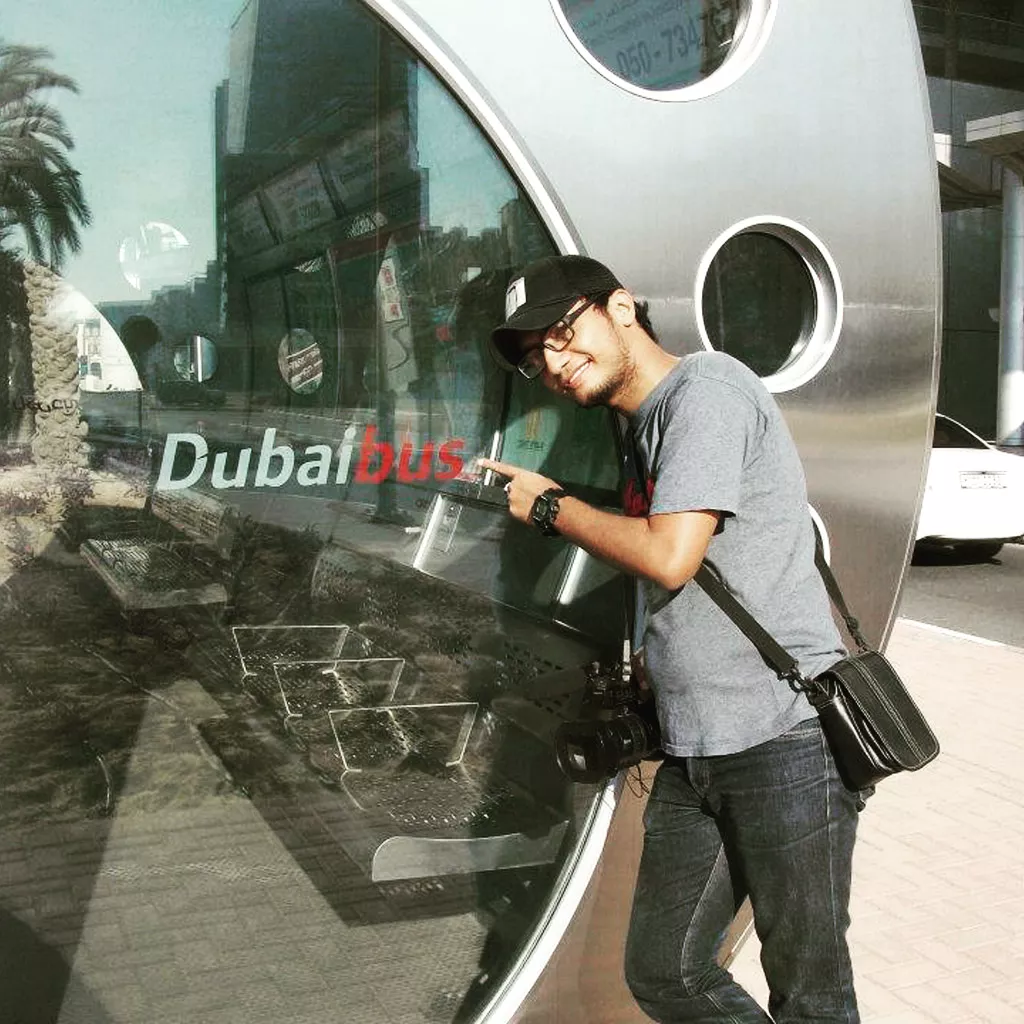
Meet the Author :
Giostanovlatto, learned long ago that Bali reveals more when you stop trying to control it. He isn’t here to sell postcard moments—he’s here to translate the island’s rhythms so your first time in Bali actually makes sense. He listens more than he talks, notices the details most travelers miss, and writes so you can feel a little less like a visitor and a little more at home. When he’s not typing, he’s in a warung with a coffee, asking locals the kind of questions only a curious outsider dares to ask.













































